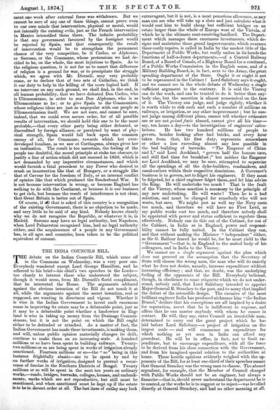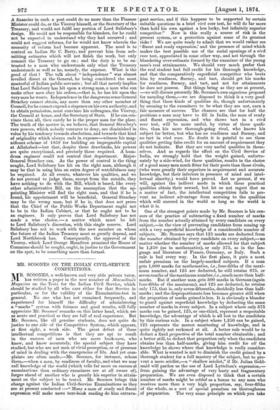THE INDIA COUNCILS BILL.
THE debateon the Indian Councils Bill, which came off in the Commons on Wednesday, was a very poor one. Everybody wandered except Lord George Hamilton, and he adhered to his brief—his chief's two speeches in the Lords— too closely to interest those who understood the subject, though it would seem, from Mr. Disraeli's florid compliment, that he interested the House. The arguments adduced against the obvious intention of the Bill do not touch it at all, while the arguments against the secret intention, real or supposed, are wanting in directness and vigour. Whether it is wise in the Indian Government to invest such enormous CUM in improving its estate may be a debateable point, just as it may be a debateable point whether a landowner in Eng- land is wise in taking up money from the Drainage Commis- sioners, but it is not the point on which the Bill ought either to be defended or attacked. As a matter of fact, the Indian Government has made these investments, is making them, and will, unless public opinion materially changes its drift, continue to make them on an increasing scale. A hundred „millions or so have been spent in building railways. Twenty- two millions or so are being spent in works of irrigation already sanctioned. Fourteen millions or so—the " so " being in this instance frightfully elastic—are to be spent by and by .on further works of irrigatiom designed to prevent a recur- rence of famine in the Northern Districts of Bengal. Twenty millions or so will be spent in the next ten years on ordinary works,—roads, bridges, barracks, colleges, houses, and embank- ments, works which are not reproductive, but still must be sanctioned, and when sanctioned must be kept up if the estate is to be in decent order at all. The last item of outlay may look ' extravagant, but it is not, is a most penurious allowance, as any man can see who will take up a slate and just calculate what it would cost him to build cheap but sufficient bridges on an estate larger than the whole of Europe west of the Vistula,.of which he is the ultimate rent-receiving landlord. The Depart- ment whizh manages these enormous investments, which de- signs and maintains these grand improvements, which oversees these costly repairs, is called in India by the modest title of the Department of Public Works, but really unites in its hands the functions of half-a-dozen departments,--of a Central Railway Board, of a Board of Canals, of a Highway Board for a continent, of a Public Works Commission in the English sense, and of a Military Building Board,is, in fact, next to the Army, the great spending department of the State. Ought it or ought it not to be represented in the Cabinet? Lord Salisbury says it ought, and we cannot see in the whole debate of Wednesday a single sufficient argument to the contrary. It is said the Viceroy can do the work, and can be trusted to do it better than any- body else, but the assertion is almost nonsensical on the face of it. The Viceroy can judge, and judge rightly, whether it is worth while to risk such and such a number of millions on railways, or irrigation, or any other improvement ; but he can- not judge among different plans, cannot tell whether estimates are or are not prime/ /axis absurd, cannot give all his time-- say, ten hours a day—to the investigation of engineers' calcu- lations. He has two hundred millions of people to govern, besides looking after bad bricks, and every hour taken from that, his first duty, represents somewhere er other a loss exceeding almost any loss possible in the bad building of barracks. "The Emperor of China and I," said Lord Auckland, "govern Ivalf the human race, and still find time for breakfast ;" but neither the Emparer nor Lord Auckland, we may be sure, attempted to snpenvise all the spendings of all the dyke-builders, roadmakers, and canal-cutters within their respective dominions. A Governor's business is to govern, not to fidget his engineers. If they must be fidgeted, let a chief engineer fidget them,and let him advise the Sing. He will undertake too mueh ? That is the fault of the Viceroy, whose sanction is necessary to the principle of any new undertaking. He will waste ? Then he is a lad selection, and must be changed for somebody who will not waste, but save. We might just as well say the Navy costs too much, and therefore we will have no First Lord, as say public works cost too much, and therefore nobody shall be appointed with power and status sufficient to regulate them effectively. Nobody can do this out of the Cabinet, for out of the Cabinet, in India as in England, power and responai- bility cannot be fully united. In the Cabinet they can, and that without making the Minister " independent " either, as Sir G. Balfour feared he would be, for he must yield to the " Government"—that is, in England to the united body of his colleagues, and in India to the Viceroy.
We cannot see a single argument against the plan which does not proceed on the assumption that the Secretary of State will choose the wrong man, the man who will do exactly what he does not desire, namely, increase expenditure witlibut increasing efficiency ; and that, no doubt, was the underlying feeling of the opponents of the Bill. Everybody believed, though, in obedience to some etiquette which we do not under- stand, nobody said, that Lord Salisbury intended to appoint Major-General R. Strachey to the post, and to many that implied the defeat of the ostensible design. The enemies of the most brilliant engineer India has produced nickname him "the Indian Brunel," declare that his conceptions are all inspired by a desire for reputation, assert that he is indifferent to expense, and affirm that he can master anybody with whom he comes in contact. He will, they say, enter Council an irresistible man, determined to carry out the great project which he has laid before Lord Salisbury—a project of irrigation on the largest scale — and will commence an expenditure for which nothing as yet seen in India can afford any precedent. He will be in office, in fact, not to limit ex- penditure, but to encourage expenditure, with all the force to be derived from his close connection with the Government, and from his imagined special relation to the authorities at home. These hostile opinions evidently weighed with the op- ponents of the Bill, for at least one-third of their speeches meant that General Strachey was the wrong man to choose. The absurd argunlent, for example, that the Member of Council charged with Public Works should not be an engineer, but always a financier—that is, should never understand the department he is to control, or the works he is to suggest or to reject—was levelled directly at General Strachey, and had no other meaning At all. A financier in such a post could do no more than the Finance Minister could do, or the Viceroy himself, or the Secretary of the Treasury, and would not fulfil any portion of Lord Salisbury's design. He could not be responsible for blunders, for he could not be expected to understand why they had occurred ; and could not suggest reforms, for he would not know wherein the necessity of reform had become apparent. The need is to control an Indian Sir C. Barry, and prevent him from sub- mitting estimates which Will not finish the work, but only commit the Treasury to go on ; and the duty is to be en- trusted to a man who understands only what the Treasury understands as well as he, namely, the expense. What is the good of that ? The talk about " independence " was almost levelled direct at the General, he being considered the most masterful of Indian public servants ; but all that merely implies that Lord Salisbury has hit upon a strong man, a man who can make other men obey his orders,—that is, he has hit upon the very man he wants. Independence in the dangerous sense General Strachey cannot obtain, any more than any other member of Council, for he cannot expend a sixpence on his own authority, and to obtain permission, must convince his colleagues, the Viceroy, the Council at home, and the Secretary of State. If he can con- vince them all, then surely he is the proper Man for the place. The truth of the matter is, we believe, that General Strachey's rare powers, which nobody ventures to deny, are diminished in value by his tendency towards absolutism, and towards that kind of originality which always ends in expense--witness his mag- nificent scheme of 1859 for building an impregnable capital at Allahabad—but that, despite these drawbacks, his powers are quite exceptional, and precisely those required. A hum- drum engineer could not control that department. Major- General Strachey can. As the power of control is the thing sought, Lord Salisbury has hit on the right man, although it may be that in using him an extra degree of watchfulness may be required. At all events, whatever his qualities, and we do not pretend to judge them, except from the outside, they have nothing to do with the Bill, which it based, like every other administrative Bill, on the assumption that the ap- pointing Minister will find the right man, and that if he is found, his appointment will be beneficial. General Strachey may be the wrong man, but if he is, that does not prove that the Chief of the Public Works Department ought not to be in the Indian Cabinet, or that he ought not to be an engineer. It only proves that Lord Salisbury has not made a wise choice,— a matter which must be left to Lord Salisbury's discretion, with this single reserve. Lord Salisbury has not to work with the new member on whom the future of the Indian Treasury must so greatly depend, and Lord Northbrook has. Consequently, the approval of the Viceroy, which Lord George Hamilton promised the House of Commons should be sought, ought, in justice to the Government on the spot, to be something more than formal.































 Previous page
Previous page